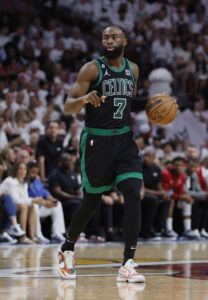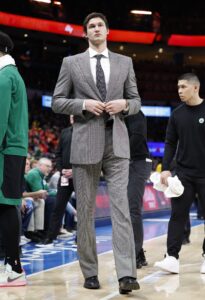After coming within two games of winning their 18th championship in 2021/22 under first-year head coach Ime Udoka, the Celtics had both a promising and strange offseason last year.
On the plus side, they traded for guard Malcolm Brogdon, who went on to win Sixth Man of the Year, and signed veteran forward Danilo Gallinari. Unfortunately, Gallinari tore his ACL while playing with the Italian national team last summer, and then Udoka was suspended for the ’22/23 season last September for violating “organizational guidelines” after a consensual affair with a female staffer.
Despite the dramatic circumstances that unexpectedly thrust Joe Mazzulla into the lead coaching role, Boston’s on-court results actually improved during the regular season. The team won six more games en route to a 57-25 record, the second-best mark in the NBA.
The Celtics had all the hallmarks of a championship-caliber club entering the playoffs, holding the league’s second-best offense and defense and the top overall net rating (plus-6.7).
Things quickly went awry in the postseason, however, with the Celtics unexpectedly dropping a couple of games in their first-round series against the Hawks before facing a 3-2 deficit in their second-round series against the Sixers. Boston pulled through by winning the final two games, advancing to the Eastern Conference Finals, only to immediately lose three straight against the Heat and face the unprecedented task of trying to win four consecutive elimination games.
The Celtics staged an admirable comeback, winning three in a row to even the series, but got blown out at home in Game 7, with Jayson Tatum suffering an ankle injury on the game’s first play and Jaylen Brown struggling mightily, going 8-of-23 from the field along with eight turnovers.
The Celtics’ Offseason Plan
 While they obviously fell short of their ultimate goal of winning the title, it’s still impressive that the Celtics have advanced to at least the Conference Finals in five of the past seven seasons. That illustrates how close they’ve been to a breakthrough for several years now while also showing how incredibly difficult it is to win four consecutive playoff series in order to emerge with the Larry O’Brien trophy.
While they obviously fell short of their ultimate goal of winning the title, it’s still impressive that the Celtics have advanced to at least the Conference Finals in five of the past seven seasons. That illustrates how close they’ve been to a breakthrough for several years now while also showing how incredibly difficult it is to win four consecutive playoff series in order to emerge with the Larry O’Brien trophy.
Only a handful of teams have just one unrestricted free agent this summer, at least right now, and Boston is one of them. However, that doesn’t mean the Celtics don’t have some important decisions to make in the coming weeks.
Brown became eligible for a super-max extension after his first All-NBA berth in ’22/23, earning a spot on the Second Team. Based on what president of basketball operations Brad Stevens said after they were eliminated, it sounds like the Celtics fully intend to offer Brown the projected five-year, $290MM+ contract, which would be the largest in NBA history.
Tatum will also be extension-eligible, but he’ll definitely wait a year to maximize his earnings. The 25-year-old will be in position to sign his own super-max contract in 2024 no matter how the upcoming season goes, having met the performance criteria by making the All-NBA First Team in each of the past two seasons. He just needs one more year of NBA experience to officially become super-max eligible.
Would the Celtics be open to trading Brown if the right opportunity arose? Perhaps. But he’s only 26, and they’ve obviously had a lot of success with him and Tatum. It seems far more likely that the club will continue to try to complement its stars rather than split them up.
Brown’s possible extension won’t kick in until ’24/25, so the Celtics have one season of leeway until things start to get really complicated from a financial standpoint. That said, bringing back the same core group next season — if that’s even the goal — won’t be cheap.
Forward Grant Williams will be a restricted free agent, and while his season was a little uneven (in part due to injury), he’s due for a big raise on the $4.3MM he made this past season. His numbers (8.1 PPG and 4.6 RPG in 25.9 MPG) look modest on the surface, but he has turned himself into a very good shooter and he’s a versatile defender as well, so his skill set has a lot of value, especially in a free agent class without much star talent available.
Gallinari is a near-lock to exercise his $6.8MM player option coming off a major injury. That would leave the Celtics with a $158MM+ payroll with 10 players on guaranteed contracts. The projected luxury tax line is $162MM, and the highly-restrictive second tax apron is at $179.5MM.
I’m not sure how much money Williams will receive, but for the sake of argument let’s say he re-signs with Boston on a four-year, $60MM contract, with a $15MM annual cap hit. That would put the team’s payroll at $173MM+ with 11 players under contract.
In that scenario, the Celtics could (barely) stay below the second apron as long as their three other players are on minimum deals, but they wouldn’t be able to use the mid-level exception to sign a free agent. They’d also have to decline their $3.5MM team option on Mike Muscala, which isn’t a deal-breaker or anything since he wasn’t in the playoff rotation.
If they’re not confident in Gallinari’s ability to bounce back from a second torn ACL (he’ll be 35 in August), they could offload his salary by attaching some draft capital. That should enable them to use the taxpayer MLE, though at $5MM it’s fair to wonder how impactful that addition might be.
Payton Pritchard requested a trade before the February deadline and was disappointed to not be dealt, so he’s an obvious candidate to be moved if the Celtics can find something they like. They definitely won’t just salary dump him because he wants a bigger opportunity though. If Boston is hesitant to use draft assets to move off Gallinari, the team could package Pritchard with him instead.
In the playoffs, one thing that really stood out to me was Robert Williams was not the all-over-the-place defensive force that he was in ’21/22. That makes sense, since he was slow to recover from a second knee procedure in training camp and was limited to just 35 games, but the Celtics certainly missed his roaming weak-side play-making and ability to change shots. Hopefully he’ll regain his prior form, but it’s worth monitoring how he looks to start next season, as his game is very reliant on athleticism.
It may seem like I’m implying the Celtics will have a quiet offseason, and that could end up being the case. However, Stevens has consistently been active in looking for roster upgrades, and he won’t hesitate to shake things up if he thinks it will improve their odds of winning their first championship since 2008.
Salary Cap Situation
Guaranteed Salary
 Jayson Tatum ($32,600,060)
Jayson Tatum ($32,600,060)- Jaylen Brown ($31,830,357)
- Malcolm Brogdon ($22,500,000)
- Marcus Smart ($18,583,713)
- Derrick White ($18,357,143)
- Robert Williams ($11,571,429)
- Al Horford ($10,000,000)
- Payton Pritchard ($4,037,278)
- Sam Hauser ($1,927,896)
- Total: $151,407,876
Dead/Retained Salary
Player Options
Team Options
Non-Guaranteed Salary
- Luke Kornet ($2,413,304)
- Justin Champagnie ($1,927,896)
- Note: Champagnie would receive a partial guarantee of $50K if he’s not waived on or before August 1; that partial guarantee would increase to $350K if he’s not waived on or before the first day of the regular season.
- Total: $4,341,200
Restricted Free Agents
Two-Way Free Agents
Draft Picks
- No. 35 overall (cap hold)
Extension-Eligible Players
- Malcolm Brogdon (veteran)
- Jaylen Brown (veteran)
- Jayson Tatum (veteran)
- Derrick White (veteran)
- Payton Pritchard (rookie scale)
Note: These are players who are either already eligible for an extension or will become eligible before the 2023/24 season begins. Tatum is ineligible to sign the super-max extension he has qualified for until 2024.
Unrestricted Free Agents / Other Cap Holds
Cap Exceptions Available
- Taxpayer mid-level exception: $5,000,000
- Trade exception: $1,836,090
- Trade exception: $1,160,955
Note: The Celtics would lose the taxpayer mid-level exception if their team salary is above the second tax apron; they would gain access to the full mid-level exception and the bi-annual exception if their team salary remains below both tax aprons.
 Gallinari signed a two-year, $13.3MM contract with Boston as a free agent last summer. However, he never suited up for his new club, having missed the entire ’22/23 season with a major knee injury.
Gallinari signed a two-year, $13.3MM contract with Boston as a free agent last summer. However, he never suited up for his new club, having missed the entire ’22/23 season with a major knee injury. While they obviously fell short of their ultimate goal of winning the title, it’s still impressive that the Celtics have advanced to at least the Conference Finals in five of the past seven seasons. That illustrates how close they’ve been to a breakthrough for several years now while also showing how incredibly difficult it is to win four consecutive playoff series in order to emerge with the Larry O’Brien trophy.
While they obviously fell short of their ultimate goal of winning the title, it’s still impressive that the Celtics have advanced to at least the Conference Finals in five of the past seven seasons. That illustrates how close they’ve been to a breakthrough for several years now while also showing how incredibly difficult it is to win four consecutive playoff series in order to emerge with the Larry O’Brien trophy. Jayson Tatum
Jayson Tatum